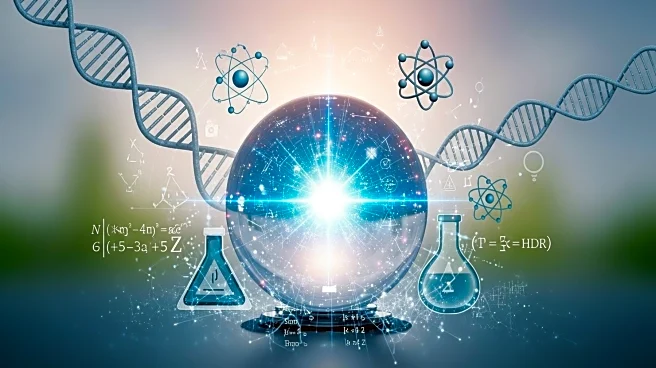What's Happening?
A group of Canadian scientists has shared their predictions for the next 50 years of scientific advancements during a special event at the Perimeter Institute for Theoretical Physics in Waterloo, Ontario. The discussion, part of CBC Radio's Quirks & Quarks 50th anniversary, covered various topics including the modernization of farming, climate change solutions, genetic advancements, and the potential for bionic humans. Evan Fraser from the University of Guelph emphasized the need for sustainable farming practices to address the growing global population and reduce greenhouse gas emissions. Laura Tozer from the University of Toronto Scarborough highlighted the importance of transitioning to renewable energy sources to combat climate change. Yvonne Bombard from Unity Health St. Michael's Hospital discussed the potential of personalized medicine through genetic profiling. Ana Luisa Trejos from Western University explored the future of wearable exoskeletons that could enhance human capabilities. Theoretical astrophysicist Katie Mack focused on the mysteries of dark matter and dark energy, while Luke Stark from Western University examined the ethical implications of artificial intelligence.
Why It's Important?
These scientific predictions underscore the potential for transformative changes in various sectors, including agriculture, healthcare, energy, and technology. The emphasis on sustainable farming practices and renewable energy sources could significantly impact environmental policies and reduce carbon footprints. Personalized medicine through genetic advancements promises to revolutionize healthcare by offering tailored treatments, potentially improving patient outcomes and reducing healthcare costs. The development of bionic technologies could enhance human capabilities, leading to new opportunities in medical rehabilitation and workforce productivity. Understanding dark matter and dark energy could provide insights into the fundamental nature of the universe, influencing future scientific research and technological innovations. The ethical considerations surrounding artificial intelligence highlight the need for responsible development and regulation to ensure positive societal impacts.
What's Next?
The next steps involve continued research and development in these scientific fields, with potential collaborations between academic institutions, government agencies, and private companies. Policymakers may need to consider new regulations and incentives to support sustainable practices and technological innovations. The integration of personalized medicine into healthcare systems will require infrastructure development and data management solutions to handle genetic information securely. As renewable energy technologies advance, investments in modernizing power grids and infrastructure will be crucial to support widespread adoption. The ethical implications of artificial intelligence will likely lead to ongoing debates and policy discussions to ensure equitable access and prevent misuse. Scientists will continue to explore the mysteries of dark matter and dark energy, potentially leading to groundbreaking discoveries that could reshape our understanding of the universe.
Beyond the Headlines
The predictions highlight the ethical and cultural dimensions of scientific advancements, particularly in the fields of artificial intelligence and genetics. The development of AI technologies raises questions about privacy, data security, and the potential for bias in decision-making processes. Ensuring diverse representation in genetic research is crucial to avoid disparities in healthcare outcomes across different populations. The shift towards sustainable farming practices and renewable energy sources reflects a growing cultural awareness of environmental issues and the need for collective action to address climate change. The exploration of bionic technologies challenges traditional notions of human capabilities and raises ethical considerations about the extent of human enhancement. These developments could lead to long-term shifts in societal values and priorities, influencing future generations.









